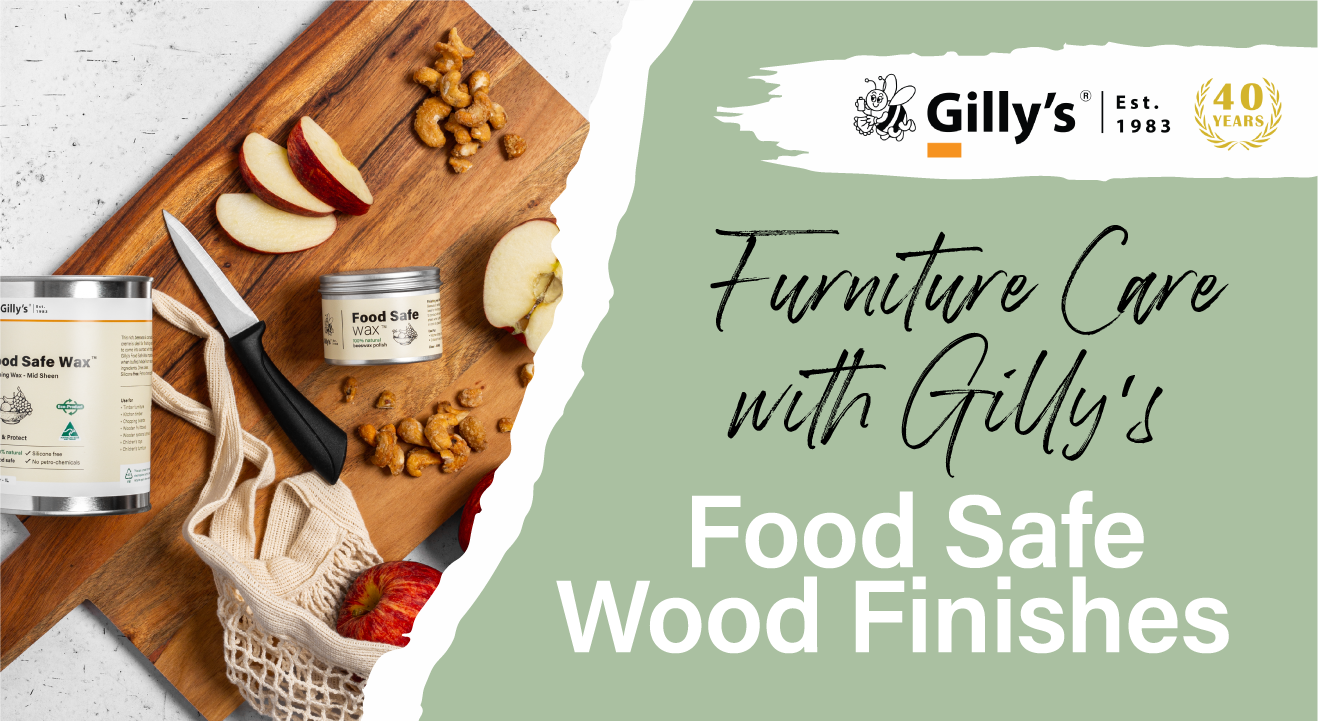
A food-safe finish is a non-toxic coating that is designed for items that come into contact with food. The key criteria for a food-safe finish are that the finish itself is non-toxic and that it is applied and allowed to cure properly. In the case of finishes that contain drying oils (such as tung oil or hemp oil for example), this is usually around 30 days.
Why a Food-Safe Finish is Essential for Your Kitchenware
Kitchenware items like cutting boards, bowls and mixing spoons are often made from wood, and need to be protected to prevent food particles and moisture from penetrating the wood and becoming a breeding ground for bacteria and mould.
Items that regularly come into contact with food and water should have a protective coating to help to extend the life of the kitchenware and prevent any warping or cracking.
Food-safe finishes for wood are made from non-toxic, inert and naturally derived ingredients, ensuring health and safety during food preparation and serving. Unlike some traditional finishes, they don't contain any solvents, potentially hazardous substances, or any other chemicals that could migrate or transfer into your food when it comes into contact with such kitchenware.
Natural vs Synthetic Food-Safe Finishes
Both natural oils and synthetic finishes are designed to penetrate and protect wood, and you should always make sure the product is labelled ‘food-grade’ or has specific food safety certifications, and choices should be based on the desired durability, maintenance, aesthetics and of course, the environment.
Natural food-safe oils include:
- Tung Oil: Creates a durable, water-resistant, hard-wearing finish.
- Mineral Oil: Helps condition the wood.
- Walnut and Hemp Oil: Both help provide a food-safe finish.
Waxes, such as beeswax and Carnauba wax, when blended with oil or emulsified allow easy application to provide a protective and water-resistant barrier.
Shellac is a non-toxic resin from the lac beetle that provides a glossy finish, but is not suitable for contact with alcohol.
Polyurethane is a synthetic food-safe finish that can offer high durability and chemical resistance once fully cured, but synthetic finishes often require a longer curing time before they become fully food safe and resistant to chemicals.
Pros & cons of natural finishes:
- Made from renewable, natural ingredients, do not contain harmful chemicals and are safe for direct contact with food.
- Penetrate the wood to enhance its natural grain and colour.
- Eco-friendly and biodegradable.
- Easy to apply with no special equipment needed.
- Require more frequent reapplication and maintenance.
- Less durable than synthetic finishes.
- Often not completely waterproof and may not protect fully against scratches.
Pros & cons of synthetic finishes:
- Provides excellent protection against scratches, stains and moisture.
- Offers a higher level of water resistance than natural finishes.
- Can achieve different finishes like clear, glossy, warm or natural depending on the type.
- Can emit strong odours during application.
- May contain high levels of VOCs (Volatile Organic Compounds) which can cause health problems.
- Whilst some may be considered safe when cured they may still leach chemicals into the food.
Gilly's Food-Safe Range: The Natural Choice for Your Home
If you want to feel 100% confident that your finishes are completely safe for you and the environment, then you need to choose natural products.
Gilly's has a wide range of wonderful, food-safe products that can be used for a variety of different uses, and all are made from natural ingredients, many of which are local, and are petro-chemical free and non-toxic, making them the safest choice for your home.
Gilly's range includes:
- Orange Oil: An all-purpose maintenance oil for all types of wood, with a wonderful smell.
- Liquid Beeswax: Great for nourishing wood, protecting it from dryness and enhancing its natural grain.
- Chopping Board Oil: Put life back into your chopping board with this citrus-based oil.
- Food-Safe Wax: Does exactly what it says on the tin! Ideal to nourish wood in food preparation areas.
- Tung Oil: A great alternative to synthetic finishes as it seals and protects surfaces.
- Carnauba Wax Flakes: When mixed with softening ingredients, provides the hardest natural timber finish and can produce a beautiful gloss-like finish.
- Hemp Oil: A premium, natural drying oil that makes a great alternative to synthetic products.
How to Prepare Your Wooden Items for a Food-Safe Finish
All of Gilly's natural food-safe finishes come with clear instructions on how best to apply the specific product of your choice to your selected items, but the preparation is also important in order for the finish to soak in and work properly.
Always make sure the wood is completely clean of any dust, dirt or debris before you begin, by wiping with a lint-free cloth. Then using a clean cloth, apply a thin, even layer of your chosen finish over the entire surface of the wood.
Follow the specific instructions for your chosen product regarding drying and reapplication times, allowing each coat to soak in before applying the next, and allow for the final finish to cure completely (this can take several days or weeks depending on the product) before using the item for food.
By using food-safe products and following the application instructions you will have wonderful wooden kitchenware and surfaces that look good, smell great and are completely natural and safe!
